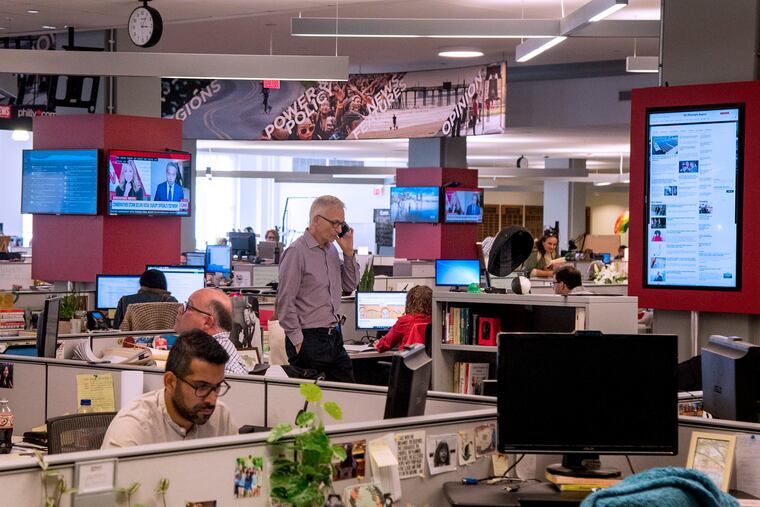Facebook to pay Inquirer, Wall Street Journal, other outlets for real news
Facebook is expected to announce the new Facebook News tab and agreements with hundreds of news organizations on Friday, marking the first time the fast-growing company has agreed to pay for news.

Facebook, the social media giant criticized for spreading false information and hate speech online, has reached deals to pay The Inquirer, the Wall Street Journal, the New York Post, BuzzFeed, and other fact-based news organizations for content for a new feature.
Facebook is expected to announce the new Facebook News tab with agreements with hundreds of news organizations on Friday, marking the first time the fast-growing company has agreed to pay for news. Some newsrooms will be paid licensing fees.
Facebook, with more than 240 million monthly users in the United States and Canada, says it will “showcase original reporting” in Philadelphia, Los Angeles, Chicago, Dallas, and other big cities. Editors, as opposed to computer algorithms, will curate the leading headlines on the Facebook News tab.
Subsections for news categories such as sports or entertainment will be chosen by an algorithm, which will push “suggested" stories.
In developing Facebook News, the social media company said it surveyed 100,000 users earlier this year and learned that they wanted more content around entertainment, health, business, and sports. Facebook also said it consulted with news organizations about how stories should be presented.
The new licensing revenue provides some support as The Inquirer and other legacy news organizations face eroding print advertising revenue, in large part because of targeted ads on Facebook and Google. The added click-throughs to member newspaper websites from Facebook’s News feature could drive subscriptions at The Inquirer and others increasingly relying on revenue from digital subscriptions, company officials say.
The Facebook deal is estimated to be worth $500,000 a year for The Inquirer. Bigger news organizations could be paid a few million dollars or even more, published reports say.
Inquirer publisher Terrance C.Z. Egger said on Thursday that “it’s a clear statement that they value the quality of our content and the integrity of the brand behind the content.” He said that he hoped the deal was the beginning of a “good codependent relationship” between The Inquirer and Facebook.
“This is an advance,” said law professor Ellen Goodman at Rutgers Law School in Camden. “This is what we have been yelling at them to do — to stop eviscerating local news by siphoning off advertising revenue.” But Goodman cautioned that even with Facebook’s new feature of trusted news sources, "the game is won or lost on amplification and where their algorithms are pushing audiences.”
David Chavern, president and chief executive of the News Media Alliance, representing nearly 2,000 U.S.-based news organizations, said on Thursday that “it’s a good thing they’re willing to pay for quality news.” But he added that the “most stressed part of the news ecosystem — local news — is not being paid.”
Another concern, Chavern said, was that publishers negotiated individually with Facebook, presenting an imbalance in leverage. Facebook has many more resources including $55 billion in 2018 revenues and a stock-market capitalization of $529 billion. “This should be considered the very early innings of figuring out what the digital market for news looks like.”
Facebook is making the announcement at a time when it needs some good press. Forty-seven state attorneys general, including those in Pennsylvania, New Jersey, and Delaware, announced on Tuesday that they were investigating the company for its business practices. The investigation will look into whether Facebook has improperly shared consumer data with advertisers, stifled consumer choice, and hiked ad prices, Jacklin Rhoads, spokesperson for Pennsylvania Attorney General Josh Shapiro, said.
On Wednesday, Facebook CEO Mark Zuckerberg testified before sniping lawmakers on the House Financial Services Committee about the company’s plans for a cryptocurrency. During the hearing, Rep. Maxine Waters, a California Democrat and the panel’s chairwoman, criticized Facebook’s decision not to fact-check political ads.
This past summer, the Federal Trade Commission fined Facebook $5 billion over privacy violations. It was "one of the largest civil penalties — for any type of conduct — in U.S. history, alongside cases involving enormous environmental damage and massive financial fraud,” FTC Chairman Joe Simons said at the time.
Zuckerberg is scheduled to appear at a press event in New York on Friday afternoon to discuss “journalism in the digital age” with News Corp. CEO Robert Thomson. Rupert Murdoch, 88, a major News Corp. shareholder, has bashed Facebook for profiting off of free news content, advocating a subscription model for trusted news content. News Corp. owns newsrooms and publishes in Australia, the United Kingdom, and the United States.
“The publishers are obviously enhancing the value and integrity of Facebook through their news and content but are not being adequately rewarded for those services,” Murdoch said in 2017. “Carriage payments would have a minor impact on Facebook’s profits but a major impact on the prospects for publishers and journalists.”